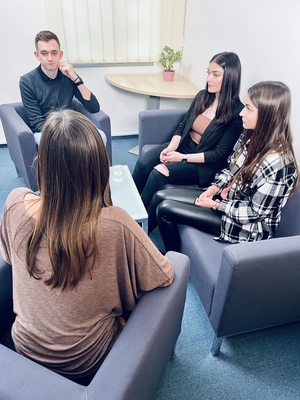What to do if someone treats you in an inappropriate way
Contacting a Counsellor for Safe MENDELU
-
It is advisable to make an appointment or arrange a phone call with the counsellor in advance so that they can reserve adequate time and space for you where you will not be disturbed. It is also possible to meet outside the university premises.
-
Such a meeting should take place within 1 week. If the selected person is busy, they may recommend that you should contact another colleague.
-
You will describe your situation to the counsellor. You will submit or bring back an Inventory of Attacks (focusing on the workplace) to complete later, and together you will discuss a strategy to address your case. The counsellor will not do anything without your consent.

-
Write down WHAT, WHERE, WHEN, HOW, WHY, to what extent, for what reasons and with what CONSEQUENCES happened.
-
Keep adding and describing all types of attacks. Keep a log of attacks, take notes and collect evidence.
-
Think about the causes of the attacks against you and try to figure out what the goal and purpose of the attacks/confrontations may be (you may not always be able to figure it out).
-
Get the perspective of others – colleagues, fellow students.
-
It may be enough for you to consult a counsellor and you can then resolve the situation yourself. You may come to the conclusion that your case needs to be formally reported and investigated. Filing a formal complaint with the faculty/university management is not mandatory. If you choose to do so, you will have our support.
-
The counsellors keep a record of each case, which is processed – once approved by you and without providing your identification information – for the purpose of setting preventive measures and implementing related system changes.
Submitting a complaint
-
Any complaint must be submitted to the Dean, the Director of the Higher Education Institute or the Rector.
-
The complaint must be made in writing. State the name of the person against whom the complaint is made, the specific incidents of alleged harassment, bullying or other inappropriate behaviour, including, if
 possible, the names of witnesses and the time of the alleged incidents. Also, your submission must indicate whether you are a student or an employee or both, and include your email or telephone contact information.
possible, the names of witnesses and the time of the alleged incidents. Also, your submission must indicate whether you are a student or an employee or both, and include your email or telephone contact information. -
A team may be set up to further investigate your case. The composition of the team is proposed, and its activities are coordinated by the Counsellor for Safe MENDELU and approved by the Dean, the Director of the Higher Education Institute or the Rector.
-
The composition of the team depends on the nature and severity of the case. The team may include a representative of the organisational unit to which the complaint relates, an internal or external consultant, a lawyer, a psychologist.
-
Our priority is to keep all members of the university community safe. Therefore, the complaints do not pose a risk to the complainant. It goes without saying that maximum discretion is maintained throughout the entire process.
Investigation procedure
-
Any complaint of inappropriate behaviour will be addressed without undue delay and in all seriousness to the person who made the complaint. The specific procedure will be determined in the light of the nature of the given case. The person who has been accused of bullying or harassment will be contacted to provide an explanation. Witnesses identified by both parties will also be contacted. All communication will be recorded in writing.
-
The university is committed to deal with complaints as sensitively, confidentially and impartially as possible. We respect the presumption of innocence. Any attempt to make false accusations will be dealt with accordingly.
Result
-
The team that investigated the case will communicate to the Dean, the Director of the Higher Education Institute or the Rector whether or not bullying or sexual harassment has occurred and what action it recommends to take. Subsequently, the Dean, the Director of the Higher Education Institute or the Rector will decide whether those measures will be implemented and communicate them to both parties. All persons involved in the case (e.g. colleagues or fellow students) will then be informed.

-
The team may recommend that the complaint should be heard by the MENDELU Ethics Committee or the Disciplinary Committee of the specific organisational unit. Where the complaints are to be heard by the Ethics or Disciplinary Committee, the procedure is in accordance with the Code of Conduct, the Rules of Procedure of the Ethics Committee and the Disciplinary Rules.
-
The measures may be:
-
Formal:
-
for employees: reprimand, termination of employment, transfer to another position, change in job description
-
for students: warning, suspension or expulsion from studies
-
-
Informal: apology, mediation, mentoring, coaching, etc.
-
-
For most cases, the goal is to restore a professional relationship between the parties. This can be achieved through MEDIATION. The goal of mediation is to resolve the matter quickly and confidentially, often without the need for a formal investigation, determination of guilt, and with minimal conflict or stress for those involved. For mediation to work effectively, it requires the voluntary participation and cooperation of both parties. The designated mediator – this is usually a staff psychologist of the Lifelong Learning Institute or another trained employee – will meet with both parties, usually separately at first, to discuss the subject-matter of the complaint. The mediator then brings the two parties together to reach a common understanding and agreement on acceptable future behaviour. Any information that comes to light during the mediation process remains strictly confidential.

